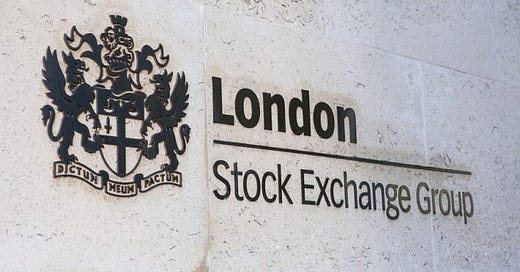Hello everyone and welcome to the latest edition of GreySpark Insights.
Please do not hesitate to contact us with any questions or comments you may have. We are always happy to elaborate on the wider implications of these headlines from our unique capital markets consultative perspective. Happy reading!
Top story
London Stock Exchange Group plans new blockchain-powered market place (see more below)
Newsflash
Buyside
FSB warns of high leverage in macro and relative-value hedge funds
The Financial Stability Board (FSB), comprised of the world’s top finance ministers, central bankers and regulators, on Wednesday warned that part of the hedge fund industry had high synthetic leverage to bond markets, raising concerns about a possible market cascade. At a time where markets are vulnerable to further liquidity strains, the issue may be more pronounced than in other market conditions. The FSB has begun work on implementing leverage measures to non-banks, which could include higher margin requirements.
Book-building platform Appital launches new initiative to help buy-side unlock liquidity
Appital has launched a new offering that allows buyside clients to unlock liquidity unavailable through traditional electronic trading venues. The offering provides peer-to-peer discovery and liquidity sourcing capabilities that is integrated with their execution management system (EMS) providers, that crucially, does not alert the market. The platform gives traders ability to react to and source liquidity in any relevant stock.
Sellside
Number of traditional exchanges seeking to offer crypto-related services on the up despite risk
According to the World Federation of Exchanges (WFE), an increasing number of traditional exchanges are set to offer crypto-related products and services despite macroeconomic and regulatory uncertainties. In a survey of 29 WFE-member exchanges, 12 said they are already offering crypto-related products or services, with a further seven planning to offer them in the future. With regard to the main drivers behind developing crypto offerings, respondents highlighted that technological advancement, new sources of revenue, and technological leadership were the primary benefits.
HSBC takes a deep dive into quantum computing
HSBC is collaborating with quantum computing company Terra Quantum on an experiment to test the use of quantum technology for optimising capital allocation. Both companies have been exploring use cases for the technology in collateral management, using high grade mathematical and algorithmic strategies to balance risks, liquidity, and profitability. Quantum computing is an emerging technology trend that uses qubits to produce processing power that is infinitely larger than the output produced by bits in traditional computing systems.
Digital transformation
DIGITEC launches new OMS to automate interdealer FX swaps workflows
FX swaps technology and data provider DIGITEC has launched its new order management system which automates interdealer FX swaps workflows, while also connecting to trading venues. Named D3 OMS, the platform combines position and risk management, OMS and EMS functionality, allowing workflow automation to increase, while also giving traders the ability to connect and place orders in the interdealer FX swaps market. Stephan von Massenbach, chief revenue officer at DIGITEC, told The TRADE that “increased client demand for FX Swaps pricing has led banks to automate their trading workflows in a drive for efficiency.”
smartTrade to launch AI offering aimed at enhancing front office trading
This week, Electronic trading platform smartTrade Technologies launched a new offering, called ‘smart Copilot’ which aims to enhance front office payments and trading by combining AI and human decision-making. Specifically, the smart Copilot offering leverages the integration of several Large Language Models (LLMs) and technologies including OpenAI ChatGPT to provide an enhanced and tailored sales assistance offering that optimises trading, while maintaining security and data protections.
Technology
LSEG plans new blockchain-powered marketplace
The London Stock Exchange Group (LSEG) is drawing up plans for a new digital marketplace that would be built on blockchain technology. Murray Roos, head of capital markets at the LSE Group, stressed that the project does not involve cryptocurrencies, only utilising blockchain infrastructure that underpins them to make the buying, selling and trading of traditional assets more efficient.
Bloomberg expands Terminal to make alternative data accessible alongside traditional financial data
Bloomberg has introduced a new alternative data function on its flagship Bloomberg Terminal, which will allow customers to gain an early read on company performance alongside traditional fundamental data. Named ALTD <GO>, the new function will support equity analysts and portfolio managers with intra-quarter insights, which can be incorporated into research workflows, paired with consensus estimates, company news, research and guidance – ahead of earnings announcements.
Regulatory developments
SEC issues ruling for a new National Market System (NMS)
The SEC has ordered the filing of a new NMS specifically directing FINRA and 18 self-regulatory organisations (SROs) associated with Cboe, Nasdaq, and NYSE to act together in developing the plan. For context, under the current NMS regime, Nasdaq, NYSE and Cboe, hold total control and voting rights related to the production and dissemination of equity market data– which has over time led market participants to believe that venues hold an unfair monopoly on the critical market data. As such, the SEC is seeking to address conflicts of interest with the introduction of a new NMS plan.
US private fund industry bodies sue SEC over new disclosure rules
In our 25 August update, you may have seen the news regarding the sweeping new measures facing the US private fund industry. As a reminder, the measures include tighter reporting requirements and limiting client expenses. However, the SEC is facing backlash from six US trade bodies representing hedge funds and private markets, who allege that its new rules are “unlawful and harmful for the industry.” Subsequently, the coalition of trade bodies have filed a lawsuit against the SEC. We’ll be keeping a close eye on this one over the coming weeks.
Trade associations urge policymakers to delete active account proposal under EMIR 3.0
European trade associations have published a joint statement urging EU policymakers to delete the proposed active account requirement under the European Market Infrastructure Regulation (EMIR 3.0). Announced in December 2022, the proposal by the European Commission would require all market participants to hold active accounts at EU central counterparties (CCPs) for clearing a portion of certain systemic derivatives contracts. The negative impacts the proposal would have on EU capital markets include introducing fragmentation, loss of netting benefits and reducing the resiliency of the EU to market stresses with no benefit to EU financial stability. The associations emphasised that the proposal will ultimately harm European pension savers and investors.
GreySpark’s take
Is there a compliance problem with banks’ communication channels?
Judging by the recent headlines, the use of illicit messaging channels amongst global banks is currently pervasive, and arguably harming the integrity of the banking industry.
As you may have seen in our 18 August update, a slew of large banks have faced multi-million dollar fines for their use of unauthorised messaging applications such as WhatsApp. Last month, the SEC announced a combine total of $549 million in fines for 11 firms, including Wells Fargo. Since 2021, investment banks such as Goldman Sachs and Citi have also faced fines, with fines for illicit messaging use now totalling circa $2 billion.
Generally, financial institutions require employees to use approved digital/electronic communication systems, such as the company email system, for business-related communication. These systems are built with cybersecurity protection controls and are made to meet required record retention and disclosure standards.
However, for convenience, employees may circumvent these controlled systems and turn to using off-channel communication when conducting business. Employees with bad motives may even opt to use off-channel methods to conceal business communication from supervisors or regulators. Additionally, the pandemic and increased home working has blurred the lines between private and professional lives, and in many cases, has led to employees using illicit chat channels unknowingly.
To avoid hefty fines and reputational damages, companies need to know what their employees are saying to colleagues, customers, and regulators. It’s also crucial they have appropriate procedures to retain that information when the regulators come calling. However, this isn’t always easy to achieve, when banks themselves have no idea what means of communications their employees may secretly be using.
Nevertheless, it is largely down to the banks to implement their own surveillance measures. Given the substantial fines currently being handed out, and a strained global banking environment, we expect banks to take greater measures to ensure that only official chat channels are used by employees. Banks may also turn to certain vendor products that can be used to capture and retain communications.
Finally, it appears the actions of US regulators have lead to a domino effect of regulatory action against illicit messaging channels, especially in the UK. Last month, UK energy regulator Ofgem fined Morgan Stanley more than £5 million after the company failed to record and retain WhatsApp messages exchanged by energy traders. It is the first-ever fine issued in Britain under legal requirements to record and retain electronic communications relating to trading wholesale energy products.
So yes, it does seem that banks’ are having problems when it comes to monitoring employee communications. With the threat of heavy financial penalties looming, it’s imperative that banks find their own way of ensuring compliance, which could be anything from a specific vendor-based solution, to more stringent internal disciplinary procedures.
What topic would you like to see us discuss next? Comment down below.
Chart of the week
Source: FinTech Global Research
The top ten most well-funded Neobanks in the UK have attracted a combined $7.9 billion in funding, with Revolut currently leading the way.
GreySpark insight
Sellside buy & build trade automation solutions 2023
Buy-and-build trade automation solutions refer to those platforms or systems that can equip sellside firms or institutions with the ability to develop their own bespoke applications while leveraging existing Tier I CIB-grade software, data management and Cloud infrastructure. The typical buyers of these solutions vary from being Tier II to Tier IV CIBs, to non-bank brokerage firms, hedge funds, proprietary trading firms, non-bank liquidity providers and exchange group screens or trading platforms.
Although the buyers of these solutions come from a wide range of financial institutions, firms and marketplaces, GreySpark observes that there are only a handful of vendors that can offer buy-and-build trade automation software that is suitable across a variety of front-, middle and back-office capital markets disciplines and can satisfy the buyer’s KPCs for such a solution. Find out more here.
What has caught our eye?
Portfolio Trading: Volumes, Execution Quality Take Center Stage
This insightful piece by Global Trading takes a look at the growing theme of portfolio trading in fixed income markets, paying testament to the increased digitisation of the fixed income trading landscape. Additionally, Tradeweb, one of the key orchestrators of this trend, provides insight on how it is maintaining execution quality with large trades, including the use of AI in producing feasible bid/offer spreads.
This report by CB Insights takes a look at the current state of play in the global fintech industry, looking at key metrics such as funding levels and deal counts. Understandably, the industry has toiled this year in the midst of a tough macroeconomic environment where capital has become more expensive and risk-averse sentiment has been prevalent.
Solving the data challenge for the buy-side front office
In this piece by The Trade, investment software provider INDATA looks at the challenges that buy-side firms face and how traditional and emerging technology tools can be used to solve these data challenges. These challenges include data aggregation and data storage, giving rise to the importance of cloud-based models, which allow the firm to focus on what they do best, rather than worry about data auditing.







